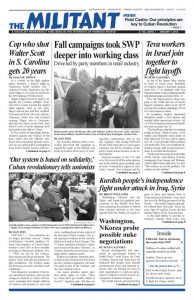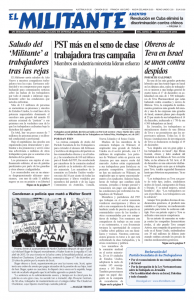Washington, Moscow and the Shiite- and Sunni-led capitalist governments in the Middle East have been jockeying for position to defend their national interests as the wars against both the Bashar al-Assad regime in Syria and Islamic State in Syria and Iraq wind down. A key facet has been the shifting prospects for the Kurds — the world’s largest nationality without their own state. There are more than 30 million Kurds divided among Turkey, Syria, Iraq and Iran.
As the final battles to oust the reactionary Islamic State from Iraq were shaping up, leaders of the Kurdistan Regional Government organized a referendum on independence. Over opposition from Washington and its imperialist allies, and almost all capitalist governments in the region, the referendum took place, passing overwhelming. Tens of thousands of Kurds took to the streets to celebrate.
Saying there could be no independence, the Shiite-led Iraqi regime organized its troops along with Tehran-backed Hashd al-Shaabi militias to seize Kirkuk, nearby oil fields and other territories in the north that had been under the protection of the KRG. The confrontation was unequal — the regime had air power, tanks and heavy artillery the Kurds lacked, all provided by Washington — and the Kurds were divided between followers of the Kurdish Democratic Party and the Patriotic Union of Kurdistan. Washington gave backhanded support to Baghdad’s forces.
The result was a serious setback for the Kurds. Their peshmerga troops withdrew from some 40 percent of the territory they had held. Kurdish toilers already faced difficult economic circumstances — Baghdad had cut off essential finances in 2014, oil prices plummeted, and the KRG took on the expense of caring for some 1.8 million refugees who sought protection there. The Kurdish people also face government corruption at every level.
With working people squeezed for cash, one-third of the markets in Erbil, the KRG capital, have closed over the past four months.
Protests broke out Dec. 17 in the Kurdish provinces of Sulaymaniyah and Halabja, with teachers, cops and thousands of other government employees demanding an end to further cuts in their wages and for improvements in electrical services. They also protested government corruption.
In Chamchamal, protesters rallied and then attacked a power plant and blocked the road between Sulaymaniyah and Kirkuk. Actions also took place in Raniya, Saed Sadiq, Taqtaq, Kalar, Qaladze and Ruwanduz.
In some places protesters set fire to the offices of all five Kurdish political parties. The Kurdistan region’s parliament and all the parties issued statements saying they agreed protesters demands were just, but urged them to keep the actions peaceful.
Syria’s Assad calls Kurds ‘traitors’
Kurds in adjoining Syria are also facing threats. Washington relied on Kurdish People’s Protection Units (YPG) forces to drive out Islamic State, and tries to limit territory in which Tehran and its ally Hezbollah had free sway. With U.S. air support, they defeated IS at Kobani, Raqqa and Deir el-Zour to the Iraqi border north of the Euphrates River.
As the Assad regime tottered, Moscow in September 2015 sent bombers and troops to prop up his rule. This effort has been largely successful, defeating the anti-Assad rebel forces that grew out of the mass mobilizations in 2011.
Damascus and Ankara have both threatened to attack the Kurds. Washington has said it will stop arming the YPG, and has asked for the return of heavy artillery “loaned” to them.
Assad called Kurds in Syria “traitors” for collaborating with Washington and carving out their own autonomous region. “All those who work for a foreign country, mainly those under American command, are traitors,” the Daily Sabah quoted Assad Dec. 18.
Ankara, which fears that Kurdish gains in Syria or Iraq would stir nationalist pride and protest in Turkey, where some half of all Kurds in the region live, also looks to target the YPG.
As part of a deal with Moscow and Tehran to monitor a so-called de-escalation zone in Syria’s Idlib province, Ankara sent troops and artillery there. They are now deployed along 22 miles of the border with Kurdish-run Afrin province, many within 1.3 miles of YPG fighters. The YPG reports daily exchanges of fire.
“We will clean Afrin of terrorists, we will clean Manbij of terrorists,” Turkish President Recep Tayyip Erdogan said Dec. 18. “We will clean Tel Abyad, Ras al-Ayn, and Qamishli of terrorists.” In other words all the Kurdish border areas in Syria.
John Studer contributed to this article.

